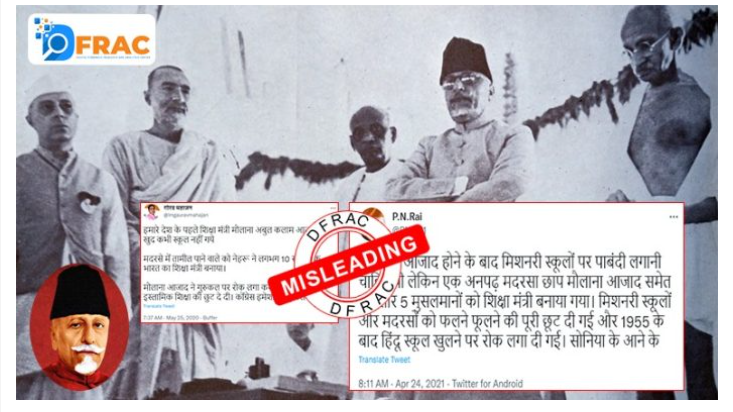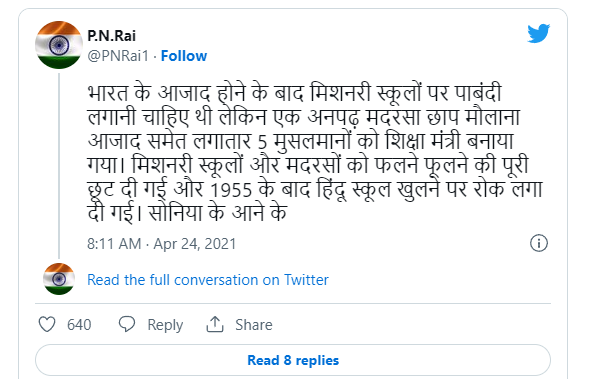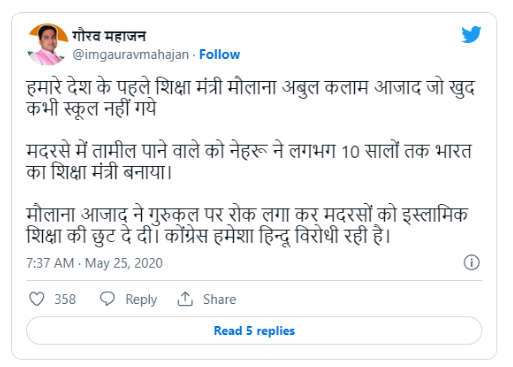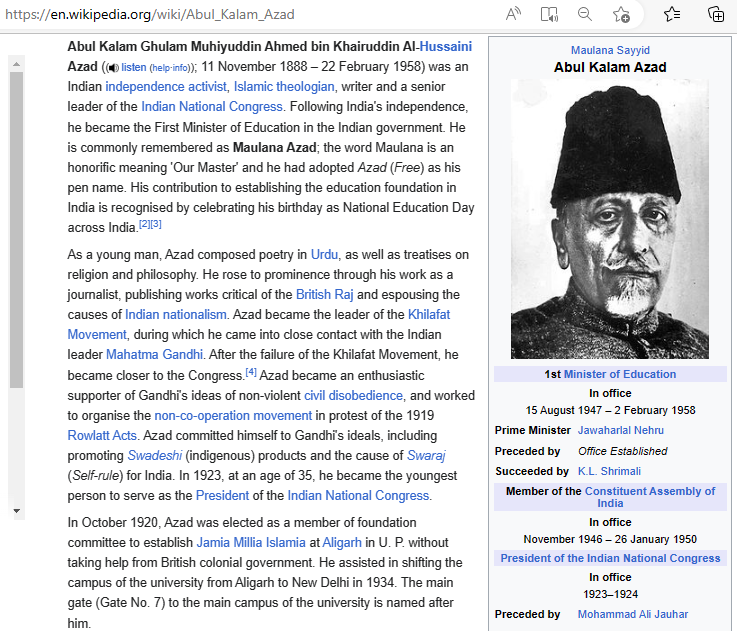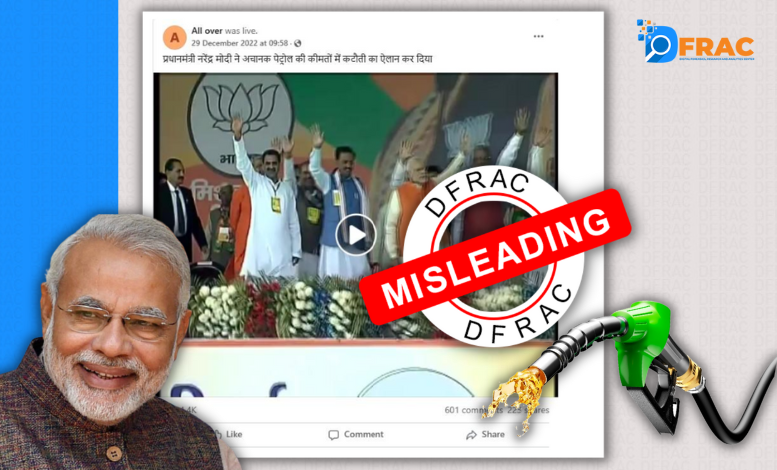It is claimed on social media sites that 5 Muslims, including India’s first Union Education Minister and freedom fighter Maulana Azad, were made education ministers in a series. At the same time, many types of misapprehensions are also spread about Maulana.
A user Pn Rai wrote” Missonary schools should have been banned after India became independent but 5 consecutive Muslims, including an illiterate madrassa raid Maulana Azad, Were made education ministers. Missionary schools and madrasas were given full freedom to prosper, and Hindu schools were banned from opening after 1955. After the arrival of Sonia, the schools were also given the status of minority schools. Christianization was carried out on a large scale in the North East and all over India. After the arrival of Modi in 2014, this process did not stop, but it did slow down. The people of the North-east especially the Nagas are turning Hindu back”
Gaurav Mahajan also tweeted the same, “Maulana Abul Kalam Azad, the first education minister of our country who himself never went to school. Nehru made him the education minister of India for about 10 years, who got the service in the madrasa. Maulana Azad banned the Gurkals and gave freedom to the madrassas for Islamic education, congress has always been anti-Hindu”
Fact check:
There are three claims in both the above tweets. The first claim is that 5 consecutive Muslims, including Maulana Azad, were made education ministers, second; Missionary schools and madrassas were given full freedom to prosper and Hindu schools were banned from opening after 1955, and the third claim was Maulana Abul Kalam Azad, the country’s first education minister who himself never went to school.
To fact-check these three claims, DFRAC did a simple search on the internet with the help of certain keywords. First of all, we tried to know whether Maulana Azad was illiterate?
DFRAC team invistigated about Maulana Azad. We found a Wikipedia page, which states that Abul Kalam Azad was born in 1888 in the city of Mecca. His real name was Muhiuddin Ahmed. Azad was home-schooled and self-taught. After becoming fluent in Arabic, Azad mastered several other languages including Bengali, Hindustani, Persian and English. He got his education in Hanafi, Maliki, Shafa’i and Hanbli fiqh, Sharia, mathematics, philosophy, world history and science by tutors. He wrote scholarly articles for Makhzan (a literary magazine) at the age of fourteen. He published a magazine at the age of sixteen.
It should be known that Maulana Azad’s father Maulana Syed Muhammad Khairuddin bin Ahmed was a great scholar. He has written many great books.
Did five consecutive education ministers in India was Muslims? To know this, DFRAC did a simple search with the help of the keyword “List of Education Minister of India“. We found that this claim is misleading because the second education minister after Maulana was KL (Kalu Lal) Shrimai. He was followed by three consecutive Muslim education ministers.
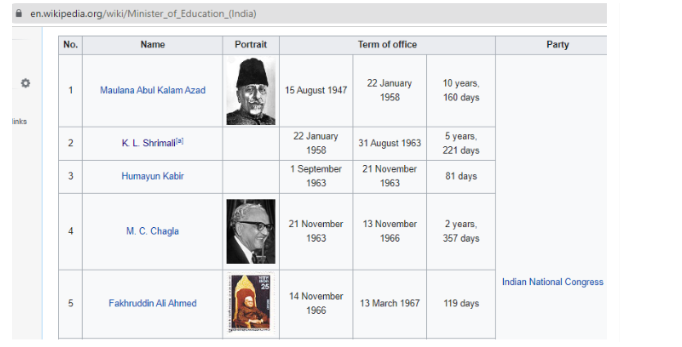
Were missionary schools and madrasas given full freedom to prosper and Hindu schools were prohibited from opening after 1955?
To fact-check this, DFRAC searched through particular keywords and key phrases, but we could not find such historical evidence. However, an article published on the website Awaaz The Vice states that the country’s first President Dr. Rajendra Prasad, while discussing the rhetoric of Maulana Azad, “He created such a wave of awareness in the country with his speeches that there was a storm of freedom all around.” Maulana Azad was against every activity promoting separatism in the name of religion.
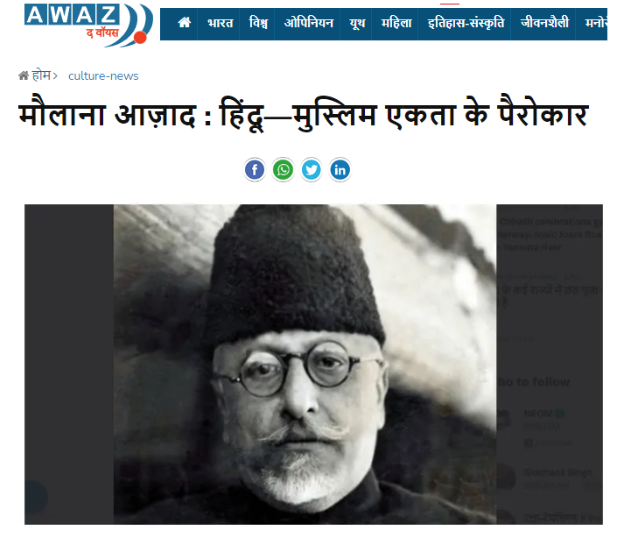
Bharat Ratna Maulana Azad was a founding member of a high-ranking university like ‘Jamia Millia Islamia’. Maulana Azad created a modern structure of education in independent India. Apart from education, he also laid the foundation of cultural policies in the country. For the development of painting, sculpture, and literature, Maulana Azad established the Lalit Kala Academy, Sangeet Natak Academy and, Sahitya Academy. He founded the Indian Council for Cultural Relations in 1950, whose main task was to create and enhance cultural relations with other countries. Maulana Azad was a unique example of national unity. He played an important role in integrating the principles of secularism, religious freedom, and equality into the Indian Constitution.
Did Maulana Azad never go to school and get served in a madrasa?
Maulana Azad has never gone to school, but it is wrong to get training in a madrasa. He went to Al-Azhar, the current largest university in Egypt. According to the Wikipedia page about Maulana Azad, his education was done at home, which is done by special teachers. (Azad was home-schooled and self-taught.)
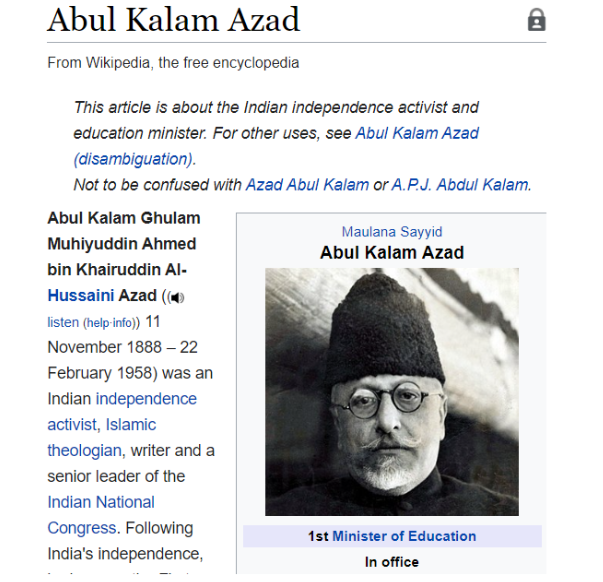
Conclusion:
It is clear from this fact check of DFRAC that Maulana Azad had received education at home and no Hindu school was banned when he was the Education Minister and after Maulana, the second Education Minister was KL Shrimali, so the claim being made by the users is unfounded and misleading.
Claimed Review: 5 Muslims, including illiterate madrasa chhap Maulana Azad, were made education minister
Claimed by: Social media users
Fact check: Misleading.


